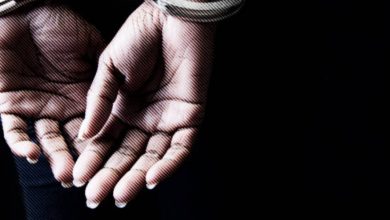Face-to-Face with a Kenyan Prisoner of the Russia–Ukraine War

Kenyan ex-athlete Evans Kibet, who travelled to Russia in 2025 expecting new opportunities, is now being held in Ukraine as a registered prisoner of war after surrendering near Vovchansk.
When Kibet left Nairobi in mid-2025, he believed he was taking a final chance to rebuild a life that had stalled. Months later, he found himself in a Ukrainian POW facility, describing how he had been recruited in Kenya, taken to Russia, and sent to the front with little preparation.
His account, while at times inconsistent, reflects the experiences of other African nationals who say they were channelled into Russian military service through opaque and often exploitative networks. On 25 August 2025, in the forests outside Vovchansk, Kibet said he had been weakened by fever and a persistent cough.
A medic had advised him to rest, but new orders sent him and an unidentified Russian soldier back into an area constantly monitored by Ukrainian drones. As they tried to avoid detection, Kibet saw bodies on the ground, including several Black fighters he believed were foreign recruits like himself.
The scene left him momentarily stunned until the sound of another drone forced him to move. Believing he was close to being killed, he sent a message to a friend in Kenya, sharing a photograph and asking the friend to care for his daughter, Chero, if he did not return.
Soon after, he broke away from the Russian soldier accompanying him and walked towards what he hoped were Ukrainian lines. By dawn, he had reached Ukrainian-held territory and surrendered.
Ukrainian soldiers quickly secured him and began questioning him about his route into the conflict. He passed through several temporary holding sites before being formally registered as a prisoner of war under the supervision of the International Committee of the Red Cross.
According to Ukrainian officials, this ensured he was protected under the Geneva Conventions. After six weeks, he was transferred to a permanent POW facility in western Ukraine.
The routine there was strict: shared accommodation, controlled heating, supervised work activities and regular visits from international monitors. Kibet said the environment was manageable but the uncertainty over his future remained difficult.
Under Ukrainian policy, his repatriation would depend on intervention from the Kenyan government or a prisoner exchange, a process that rarely includes foreign nationals. Kibet’s journey to Russia shares patterns with accounts given by other African fighters held in Ukraine. Many described being drawn in by offers of work, cultural events or travel.
Kibet initially said he had been told about a festival in Russia, and that an intermediary arranged his visa without interviews or payment. However, independent checks showed that he completed visa procedures earlier than he claimed, and records placed him at appointments he denied attending. His timeline changed during interviews, as did his descriptions of the people he travelled with.
Despite these contradictions, his story followed a pattern seen in several other cases: recruits often deliver similar explanations that emphasise confusion and lack of control, possibly to protect families or avoid legal consequences. Kibet said that once he arrived in Russia, his phone was taken away and he was presented with a contract written entirely in Russian. He signed where instructed, without understanding the terms.
Similar documents reviewed by this reporter and signed by other African nationals required a year of military service and, in some versions, offered residency upon completion. Recruits were also promised signing bonuses of about 1.9 million roubles. According to Kibet, intermediaries immediately deducted large “fees,” leaving only part of the money.
Several fighters said they struggled to access the remaining funds from the front due to restrictions in Russia’s banking system. Some alleged that agents who co-signed their accounts monitored activity as an informal way to confirm deaths, taking over the funds if the recruits did not return.
Kibet said he was taken to a remote forested camp where civilian clothes were removed and uniforms issued. Training reportedly lasted less than a week and covered only basic weapons handling and rapid drills with heavy equipment. Other detainees later told him that some recruits paid commanders to delay their deployment.
Those without money, or whose arrangements eventually collapsed, were sent to the front with minimal preparation. Before entering the recruitment system, Kibet had spent years trying to revive his athletics career. Friends in Kapsokwony and Iten said he once showed strong potential as a long-distance runner but never recovered from a hip injury in 2003.
Attempts to compete again led to debt, repeated visa failures and difficulty supporting his daughter. By 2024, he was struggling to meet basic expenses. When the offer to travel appeared, he saw it as an opportunity he could not afford to ignore.
Interviews with other fighters held in Ukraine, along with accounts from families in Kenya, point to a recruitment structure targeting men facing financial hardship and unfamiliar with Russian procedures. Tourist visas were reportedly processed with unusual ease, contracts were not translated, financial arrangements were unclear and deployment was rapid.
Several recruits also identified a senior Kenyan official in Moscow who they said acted as a link to Russian networks, though none agreed to speak on the record due to safety concerns. Kenya’s Ministry of Foreign Affairs has previously confirmed that about 200 Kenyan nationals are serving in Russian forces and that some are injured or stranded.
Questions about oversight, disruption of recruitment channels and cooperation with Ukraine and neighbouring states remain unanswered. Speaking inside the Ukrainian facility, Kibet said he wanted his experience to serve as a warning to young Kenyans considering similar offers. Economic pressures, he said, should not lead anyone into a war they do not understand.
“Going to Russia isn’t the problem,” he said. “Going to fight is. Coming back alive is almost impossible.”
He now hopes that diplomatic efforts may eventually allow him to return home to his daughter. Until then, he remains one of many African prisoners of war in Ukraine whose future depends on decisions far beyond their control.





